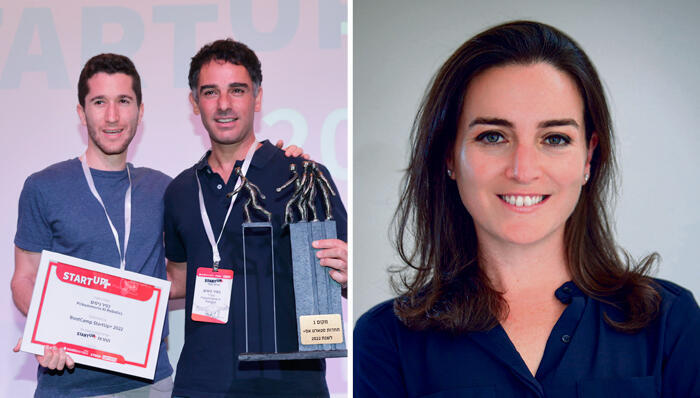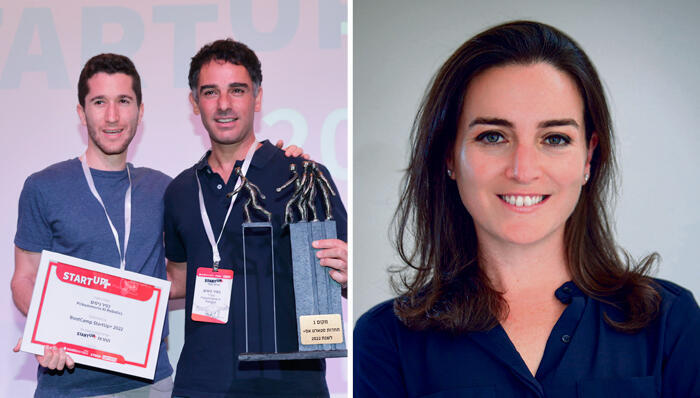
StartUp+
"The quantity and variety of new startups are essential to the ecosystem and its contribution to the economy"
"We must help, expand and speed up the efforts to support startups in the early stages,” said Michal Kissos-Hertzog, CEO of Poalim Hi-Tech, as Calcalist’s fourth Startup+ competition, in collaboration with Poalim Hi-Tech, gets underway. “But this cannot be done without the state"
Calcalist in cooperation with Poalim Hi-Tech is launching for the fourth year in a row the StartUp+ competition designed to support and launch start-ups at the beginning of their path to growth. As part of the program, 20 selected startups will have the opportunity to take part in a unique training workshop in collaboration with the Zell program for entrepreneurship from Reichman University. The five startups that will advance to the finals will appear in front of a panel of judges from among Israel's leading funds.
Last year, Pickommerce AI Robotics won first place in the competition. The company developed a picking robot known as Dumbo, which works at a rate of 500-600 items per hour and is able to analyze the item placed in front of it using artificial intelligence, understand how to hold it and how to arrange it in a box in a smart and economical way. "The competition for me was not a one-off event but part of a process,” Kfir Nissim, CEO of Pickommerce AI Robotics said this week. During the preparation days, we went over how to present the company, convey the message, refinements and even the physical accessibility of the competition. Finally, the competition as a concluding event was very exciting, and the tools I received are part of my everyday life, even now a year after the competition."
1 View gallery


CEO of Poalim Hi-Tech Michal Kissos-Hertzog (right) and last year's winner Kfir Nissim of Pickommerce AI Robotics
(Photos: Orel Cohen)
"The competition created great exposure, sparked a lot of discussion around the company and even created recognition of the capabilities and contribution that the company brings to the world,” Nissim said. “Even now, a year after winning the competition, we still receive responses and this contributes greatly in conversations with investors.”.According to him, one of the most important things he has learned in the past year as an entrepreneur is that the first steps in establishing a company are accompanied by diverse challenges "and not always in areas that are familiar to you. Much of the dealing with challenges is done for the first time - and this requires the ability to maneuver. This maneuvering should be done in light of a focused goal and not be ashamed to take direction along the way." .
Nissim also commented on the differences in the external environment this year, compared to last year: "The market feels more concentrated and companies in our category are required to show actual activity in the market in order to raise money. There is money in the market, and a lot of it, but a substantial effort is required to bring it together in an investment deal. If in the past there was market potential, a solution and an advantage, a strong team and a correct presentation would take you most of the way to promote investment, today a deeper friction is required in the market where the company is maneuvering."
Michal Kissos-Hertzog, CEO of Poalim Hi-Tech, also commented on the internal and external changes that are taking place in the high-tech market this year compared to last year. During last year's competition, Russia's invasion of Ukraine was at the top of the agenda, the global recession was just beginning to show its signs in the Israeli economy, inflation rose and interest rates began to rise sharply. This year, however, there are equally important challenges related to current events such as the collapse of Silicon Valley Bank and protests against judicial reform.
Kissos-Hertzog stated that it is not yet known what the extent of the damage from the biggest banking failure since the financial crisis in 2008 of the collapsed Silicon Valley Bank will be, but in her estimation it is clear that the impact will be extensive. According to her, the political uncertainty and instability in Israel has a very negative effect on the start-ups. "The negative impact is manifested first of all in access to financing: investors act with hesitation and apprehension regarding their investments, and this is especially true for early-stage companies. This is expected to make it very difficult for startups to secure the financing they need.
"The second and no less important thing is manpower. During such a period, workers will prefer to look for more stable employment opportunities, which affects both the difficulty in recruiting and the retention of top personnel. A third and no less troubling thing is the changing market conditions: the recession that is felt may affect the demand for the products and services that the Israeli startups offer especially in the global markets," Kissos-Hertzog said.
Therefore, according to her, start-ups in the first recruitment stages - in terms of the number of new start-ups and their diversity - cannot exist without the support of the state. "In Israel startups are very important at the beginning, but their number is getting smaller every year. Although quality is certainly more important than quantity, it is still necessary to maintain a sufficient amount of new startups and their diversity, since Israeli entrepreneurship is expressed in the establishment and growth of such companies, which is of course essential for the continued existence of the ecosystem over time, and essential for its contribution to the economy. "The current period not only does not help this, but does the opposite,” Kissos-Hertzog said. “The StartUp+ competition is just a drop in the bucket in trying to help and support startups in these stages. But this cannot be done without the state. And it starts with a true recognition of the importance of the sector to the country and its economic development."
The judges for this year's StartUp+ competition are: Tal Barnoach, Co-Founder of the Disruptive VC fund; Nofar Amikam, Partner at Glilot Capital Partners; Tami Bronner, Partner at Vertex Ventures; Avichay Nissenbaum, Partner at Lool Ventures; Michal Kissos-Hertzog', CEO of Poalim Hi-Tech; Renana Ashkenazi, General Partner at Grove Ventures; Tal Slobodkin, Partner at StageOne Ventures; Yael Alroy, Partner at Viola Ventures; Eyal Niv, Partner at Pitango; Lee Moser, partner at AnD Ventures; Rotem Eldar, Partner at 10D Capital; Adam Fisher, Senior Partner at Bessemer Venture Partners and Elihay Vidal, Editor-in-Chief of CTech.














